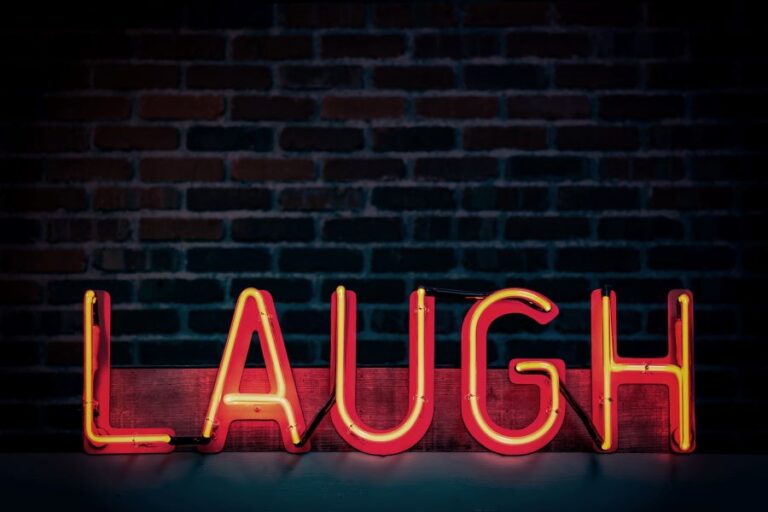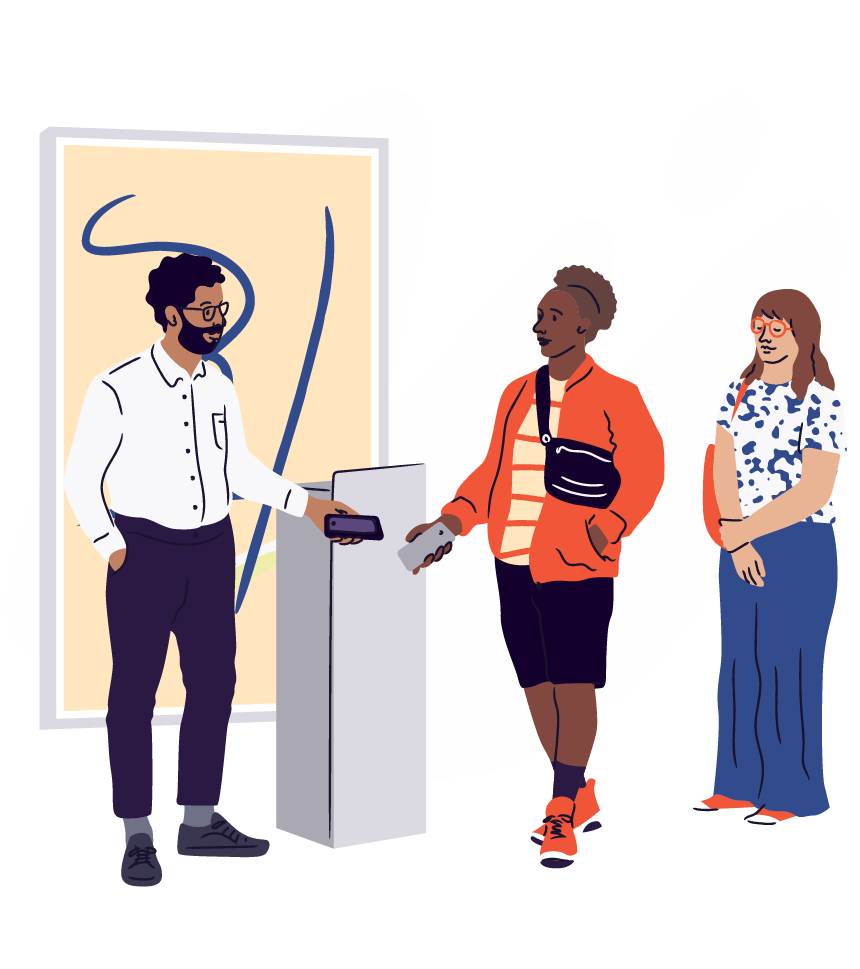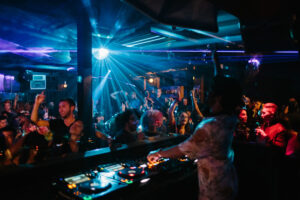A successful comedy event that runs smoothly on the night comes down to meticulous planning. And lots of it.
Whether you are hosting a one-off corporate event or a regular comedy show, careful consideration of the following factors will make for an evening remembered for the right reasons. Keep reading to learn how to plan a comedy show – because there’s nothing funny about a poorly organised comedy event. Here’s some insight into what lies ahead in this article:
- Hosting a comedy show
- What to consider when looking at a comedy event venue
- What equipment do you need when running a comedy event?
- How to promote a comedy show
- Ticketing options
- Tips to help you during the show
- After the show
- Time to start organising your hit comedy show
Hosting a comedy show
Whilst single comedian stand-up is one of the more common comedy show formats, you may want to consider these alternatives:
- Multiple comedian lineup – Share the event with one or more comedians to attract more attendees whilst still being able to have individual performances
- Open mic night – Open 10-15 minutes comedy slots and invite members of the audience to join in, whether they are amateur or professional
- Competition – Invite comedians to see who can get the most laughs (with prizes, of course) and invite more established comedians to judge the competition
- Longer-format skit shows – these comedic scenes, often performed by small groups, can be improv or scripted
What to consider when looking at a comedy event venue
When hosting a comedy night, your event venue choice can impact your success. A smaller venue will be more intimate and easier to sell out, while a theatre event may look more upscale but comes with higher expenses and requires more ticket sales. Getting the size right is essential because a half-filled event won’t look good for marketing or the comedian’s morale.
Laying out the venue
Once you have selected and booked a venue for your event, you will need to work with the venue manager to ensure it’s arranged appropriately for live comedy.
Whether you arrange the seating theatre style (in rows) or cabaret style (with tables), you will want to have as many people near the stage area as possible. A venue can be difficult for a comedian to play when the audience is spread out and scattered around the room. The more people you have concentrated towards the stage, the greater your chances of engaging the audience and the performers.
If your event is unlikely to sell out, arrange the room cabaret style instead of theatre style, which will make it look fuller. Remove any chairs you will not need, and if you’re unsure how many people will be attending, mark the rows furthest from the stage as ‘reserved’ so people have to sit towards the front of the room. You can then remove the reserved signs and release the seats as the event gets busier. Also mark as ‘reserved’ any spaces where you don’t want people to sit, especially bench seating against walls.
Think about how people will enter the room and take their seats before the show and after any intervals. Long rows make it difficult for people to get to their seats, so leaving a middle aisle will enable attendees to move around more easily. Don’t make the aisle too wide, however, or it will look like the comedians are performing to a gap.
The stage area
So that your audience can see and hear the comedians clearly, the performers should be slightly raised. If the venue does not have a stage, you should try to acquire one. Even if it’s only 10 inches high, it will draw the audience’s attention to the comedians and improve engagement. Avoid a really high stage in a small or medium-sized venue, as the people at the front of the room will have to strain to look up at the performers.
We suggest a dark backdrop behind the comedians, preferably a theatre-like curtain. This must be dark and non-reflective, as your stage lights will point directly at it.
What equipment do you need when running a comedy event?
If your venue has previously held comedy events, it likely has basic sound and lighting systems available. If not, you can look into renting or buying your own equipment, or hire a professional.
Sound system
High-quality sound is crucial to the performance. Most venues will have an in-house sound system that you can connect a microphone to and use to play music before the show and during the intervals. However, they will usually require you to bring your own microphones, mic leads, and mic stands.
Comedians tend to prefer wired microphones to wireless ones, which can have a limited range and sometimes generate feedback. The standard microphone most comedy clubs use is the Shure SM58.
There are cheaper mics available, but don’t get one with an on/off switch – the comedian could accidentally flick this during the show and cut off the sound. The mic lead should be at least five metres long to allow the performers freedom of movement. Always have a second microphone as a spare, which you can also use for off-stage announcements.
Comedians also prefer a straight microphone stand over ‘boom’ mic stands, which have an adjustable arm and are often used by musicians. A stand with a flat round base is sturdier and less cumbersome than one with a tripod base.
If you have to hire speakers and a sound system, position the speakers on either side of the stage area, facing the audience. If you have more than 120 people at your event, an additional one or two speakers for the back of the room will ensure everyone can hear.
Lighting
Lighting the performers well is another important aspect, yet it is often overlooked. Ensuring the performer and the stage are brighter than the auditorium will draw the audience’s attention to where you want it.
You’ll need at least two powerful spotlights pointed at the stage. Position the lights at symmetrical angles to the stage, for example, 45 degrees and 135 degrees. Avoid putting lights directly in front of the stage as this will make it very difficult for the performers to see.
Check that your lights are positioned correctly by having someone stand on the stage to see if they are well lit. Ask them to move around to identify any ‘dead spots’, i.e. where the performer is dark, that you need to eliminate.
When the show is about to start, dim the venue or ‘house’ lights a little. This will signal to the audience that the show is about to begin and that they should take their seats. Don’t lower the house lights too much before the show and during the interval – this will make it difficult for people to find their seats.
How to promote a comedy show
Once you have the venue, sound system, and lighting ready, it’s time to plan how you will market your event to ideally sell out the venue. Spread the word about your comedy show event by setting up a dedicated event website.
Writing your comedy event description
With hundreds of local events running each week, a catchy and informative event description is imperative for comedy show promotion. Tell potential guests exactly what kind of comedy event you are running, especially if it contains material that may offend people.
Tell everyone you know
Word-of-mouth marketing is a powerful tool, which can increase traffic to your event website and help sell out your event. Friends and family are often your biggest supporters, so ask them to spread the word and be an advertising support crew. If you have any contractual relationships with social media influencers or well-known members of the comedy scene, take advantage of these to spread the word even further.
Tell the media about your event
Having a media pack ready to go when you approach a radio station or newspaper means you can make an impact with consistent messaging. Use this information to publish across multiple platforms to create a production synopsis for ticket listings and general advertising. Common things to include in a media pack are:
- A press release
- High-resolution images of the comedian/s
- Multimedia files
- Complimentary tickets for reviewers
- Contact details for media interviews
Maximise advertising
Eventbrite Boost, with purpose-built email marketing and social media marketing tools, can extend the reach of your event and increase ticket sales. A combination of paid social media advertising and more traditional offline comedy show advertisements, such as posters and flyers, will target individuals online as well as those out and about.
Ticket giveaways
Offering complimentary tickets is a great way to promote your event and increase your social media presence. There are many options when running a giveaway, such as:
- Giving tickets to local newspapers or radio stations for prizes
- Contributing tickets to a raffle at a local event
- Offering tickets in exchange for a review from credible individuals
- Giving away tickets on social media to new followers or those who tag a friend
- Collaborating with influencers who could offer tickets on your behalf
Ticketing options
Offering various ticket types to suit different audiences can increase the likelihood of people attending your event. Some things to consider include:
Pricing your tickets
Creating a profitable pricing strategy is a balancing act. Everyone in your audience has a different budget and perceives the value of events differently. Offering several pricing options helps cater to various groups of people, such as those who are happy with a general admission ticket and those who might want a VIP experience.
Early bird tickets
Everyone loves a discount, and every event organiser loves seeing those sales rolling in early. An easy way to entice people to get their tickets as soon as they’re released is to offer early bird tickets with a discounted price incentive. Selling tickets early will also provide peace of mind to event organisers and help gauge interest in the event.
Group tickets
Group tickets are another great way to lock in extra attendees. By offering bigger discounts for additional ticket purchases, customers are financially incentivised to encourage friends and family to attend the event with them.
Tips to help you during the show
To get the best out of the performance, the audience must be 100% focused. Ensure all venue staff, especially bar staff, have been briefed not to make any noise during the show. Apart from the audience laughing, you ideally want the room silent while the comedians are performing, so check that there will be no noise coming from other parts of the venue. Switch off any flashing or coloured lights in the venue that may be distracting.
One problem that may arise during the performance is people talking or using their phones while the comedians are on stage. To combat this, create a brief ‘Code of Conduct’ sheet, stating that talking and using mobile phones is not permitted during the show, and leave this somewhere highly visible near the entrance.
Keep the show moving
For any multi-comedian stand-up event, you’ll need an event run sheet. Include a detailed schedule of what will happen when to help keep acts within their allocated timeframe and to help set and track expectations for all involved. All acts should have an allocated time slot and duration and a dedicated timekeeper who ensures everything stays on schedule.
After the show
If your event is a regular one, sit down to debrief with venue management and raise any issues you experienced that can be improved next time. It is in the venue’s interest for your events to be successful, so they may also have suggestions for improving the shows.
No event is perfect. Gathering feedback from your attendees is also crucial for learning about what went well and what didn’t, so you can continue to improve.
Time to start organising your hit comedy show
Comedy nights should be all about the comedians, which means your job is to make the experience as friction-free as possible. If planning a comedy show feels daunting, taking advantage of Eventbrite Boost will promote and elevate your event performance through proprietary data and simplified marketing tools.
By following the above tips for hosting a comedy show you’ll have a room full of happy comedy fans, and a green room full of comedians willing to recommend your night to others on the circuit. That’s smiles all ’round.





